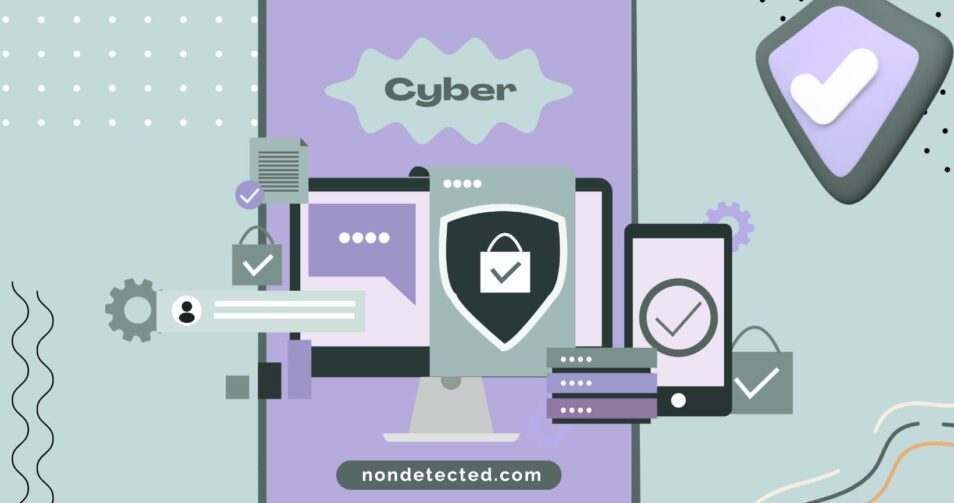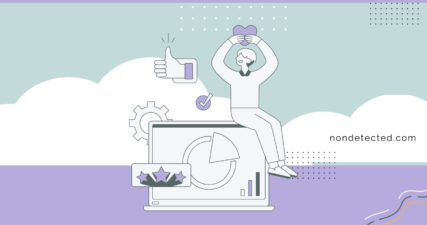How to Stop Online or Cyber Harassment?

Understanding what online harassment implies is the first step to knowing how to stop cyber harassment. In this case, it is easier for you to realize what the scope of this issue is, what actions are required to prevent it, and how to act if you witness or experience it.
The thing is that some people feel confused and do not understand what kind of abuse they are facing. Further, you can find a guide from NonDetected that includes basic concepts and explanations about the most common types of online harassment, the most significant impacts, and what to do if you experience it.
Table of Contents
What Does Online Harassment Imply?
The first thing you should realize is that online harassment involves the use of digital communication tools, the internet, or social media to belittle, threaten, or intimidate someone.
Even though everything might start with a seemingly small act, such as a rude comment, it can escalate into more aggressive behaviors. In this case, you might have to deal with stalking, spreading lies, or publishing personal information.
Where Does Cyber Harassment Happen Most Often?
Now that you know the online harassment meaning, you most probably understand that it tends to happen on social media. According to reports, around 75 percent of these cases take place on platforms, such as Instagram, Facebook, TikTok, Reddit, etc.
At the same time, you might face cyber harassment via:
- Messaging applications, like Telegram and WhatsApp;
- Email;
- Online games;
- Online forums;
- Comment sections of blogs or news websites.
How Online Harassment Affects Victims
It is obvious that cyber harassment raises significant safety concerns and has an impact on individuals who experience it, and communities should strive to offer support to these victims . Further, you can find some of the consequences:
- Emotional distress. It means that people experience depression, anxiety, isolation, and fear.
- Reputation damage. There can be harm to your professional or personal credibility, which usually happens if defamatory or false information is published online.
- Physical threats. In some cases, cyber harassment can turn into actual stalking or threats of violence.
- Career consequences. Employers might find false allegations or false posts when searching for you as a candidate.
Why Is the Cyber Harassment Issue Increasing?
As soon as you understand what is online harassment, you might start wondering why this issue is becoming more common. There are a few reasons, and here are some of them:
- Increased internet usage. A bigger number of people is using the internet for school, work, and social life, which means that there are more opportunities for online abuse.
- Anonymity. Many platforms let their users hide behind false identities or usernames, and this makes them feel that there will be no punishment.
- Polarization and political discourse. The truth is that many individuals are harassed online because of their gender, political beliefs, or race.
- Lack of accountability. Even though platforms state that they moderate content, many harassers still manage to slip through the cracks.
What Types of Cyber Harassment Are There?
While trying to figure out what cyber abuse is, you will most want to know what is considered online harassment. The truth is that it includes different forms, such as cyberstalking, cyberbullying, doxxing, online impersonation, revenge porn, swatting, and more.
Most of these actions are regarded as crimes under federal and state specific laws, depending on the harm caused to the victim and the specific behavior.
Further, you can find a few examples of online harassment.
Hate Speech
This is a common type of online harassment that includes discriminatory and offensive actions or words motivated by antipathy toward aspects of identity, such as religion, race, gender identity, etc.
Even though a legal definition of hate speech does not exist, it is characterized by name-calling, slurs, and other types of verbal abuse. You should note that it can also be introduced via memes and images on social media.
Doxxing
This is an act of revealing an individual`s personal information online with the aim of harassing them. It could be your home address, phone number, other contact details, etc. Doxxing often appears in hacker and gaming communities, but it can also affect politicians, celebrities, and journalists.
It can also range from a felony offense to a misdemeanor, depending on how much harm was caused to the victim.
Cyberbullying
This type is the intentional, repeated harm done to a group or a person in the form of threatening messages or in other forms, with the help of digital means, which are mostly social media platforms. Different parts of the world have their own laws regarding cyberbullying, including school and criminal sanctions.
Cyberstalking
It is one more type of cyber harassment that implies targeted and repeated threats, intimidation, and harassment directed toward one individual. This online abuse can include defamation, false accusations, and digital vandalism.
In many cases, these actions are crimes that are punishable under laws.
Online Impersonation
This situation occurs when someone utilizes the identity of an organization, person, or brand without their consent and with the intention of intimidating, damaging, or defrauding others.
This issue with identity theft is quite common in phishing schemes utilizing fake social media accounts and can result in costly damage to a business.
Revenge Porn
It is the non-consensual sharing of sexually explicit videos or images of someone who is often their intimate partner, ex-spouse or ex-partner. this can surely goes under sexual harassment. There are online harassment laws to address this crime, and they can lead to severe consequences for the perpetrator.
Swatting
This type happens to be an extension of doxxing, where someone fabricates a dangerous story to law enforcement about the victim.
For instance, they can state that this individual is holding someone hostage at their house. In this case, law enforcement appears in force at the victim`s residence. This is a crime that can lead to severe legal consequences for the perpetrator, as per online harassment laws.
Sextortion
This type implies a situation when someone utilizes sexually explicit videos or images to blackmail or extort a victim. Sextortion tends to include threats to distribute and share the offensive content with the victim`s family, friends, or employer if they do not comply with the demands of the bad actor.
You should consider that it is a serious cybercrime that is punishable by law.
I am Being Bullied Online. How to Stop Cyber Harassment?

At this point, you might wonder, “What can I do if someone is harassing me online?” It is natural to feel unsafe in such situations. The great part is that there are a few things that you can do at the beginning of the harassment:
- Document everything. You should keep a copy of all instances of online harassment, so you should take a screenshot or print the pages. It is important to get the messages and the profile pages where this abuse is coming from. This should be enough evidence for social media platforms or the police if the harassment escalates. This step to collect evidence is important to make sure that you have a copy if the perpetrators delete their profile and posts.
- Report it to the police immediately. The great part is that the police take online harassment seriously, which means that they have loads of experience investigating such cases. But don’t you forget to document evidence.
- Take your online security as a top priority. If the bad actor collects more information about you, they will most probably try to get access to your accounts, such as your email and social media. Turning on two-factor authentication and having strong passwords can really help. It is also a good idea to check what personal details exist online and try to erase as much as possible. For instance, you can Google yourself and see whether you can find your phone number, address, or places where you spend time. Optionally, you can ask NonDetected to do that for you.
- Remember that it is not your fault. While thinking about what to do if someone is harassing you online, you should bear in mind that online abusers can be complete strangers or people you know. It is not your fault because these individuals tend to have emotional and mental health issues.
How Do I Increase My Personal Cybersecurity?
Can you take legal action against online harassment? You can definitely do that, but it is equally important to understand how the issue can be prevented. Further, you can find a few tips from NonDetected:
- Check your privacy settings. To avoid this issue, you should make sure that your social media accounts have privacy settings. This is required to limit your content to only permitted individuals.
- Block and un-friend. As soon as bad comments occur, it is critical to be relentless in blocking any accounts or individuals responsible for the cyber abuse. The same goes for harassing email addresses and phone numbers.
- Keep personal information personal. You should never share personal details online, such as your phone number, address, credit card number, place of work, etc. This also includes sharing videos and pictures that might be revealing or sensitive.
- Use strong passwords. You should make sure that your passwords are as secure as possible. It is also important not to use the same password on different platforms and websites.
- Use a VPN. A virtual private network is a security tool that utilizes encryption to allow a secure connection in order to protect users` anonymity. The service is common in business settings, but anyone is welcome to use a VPN to make sure that details are protected. You should not ignore this step because your IP can reveal a lot about you.
When You Should Consider Professional Help with Online Abuse?
Even if you realize digital harassment what it is and take all reporting and self-managed steps, these steps might not be enough. If you want to solve the issue quickly and efficiently, you should consider hiring professionals.
NonDetected can offer you the following:
- Quick takedown requests.
- Search engine result suppression.
- Leaked content removal.
- Legal coordination when needed.
- Monitoring and alerts for recurring cyber harassment.
- Personalized reputation repair plans.
At NonDetected, we realize how tough and emotional it can be when your dignity and privacy are under attack. That is why we offer you discreet and effective support as per your specific needs.
Wrapping Up
The best thing you can do to avoid cyber harassment is to limit the information you make available online. It means that you should stay vigilant about revealing real-time data, like who you are with and where you are.
At the same time, these measures might not be enough, even if you know what is online harassment and how to prevent it. The good news is that you can always count on our reliable agency. NonDetected can help you solve the problem forever.


